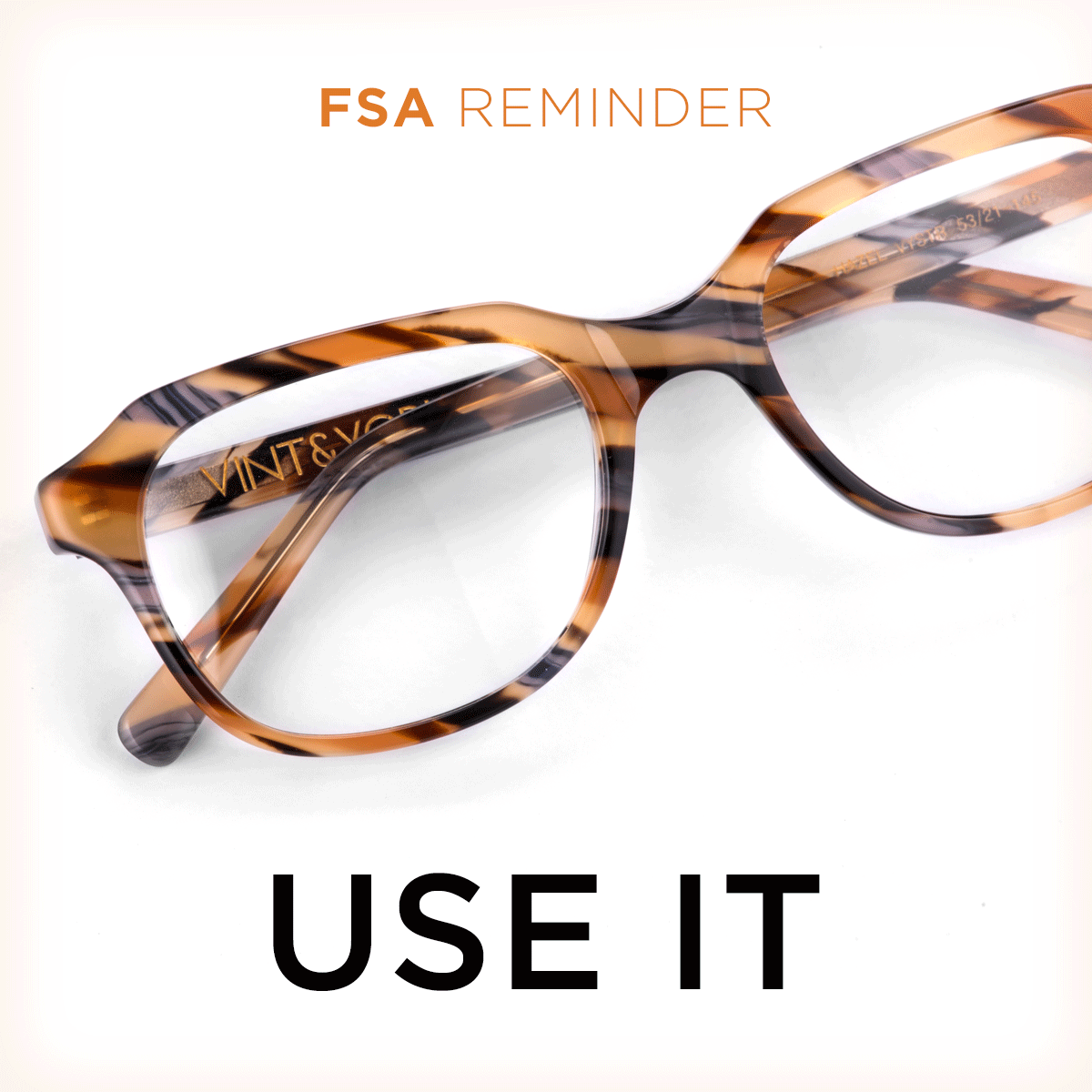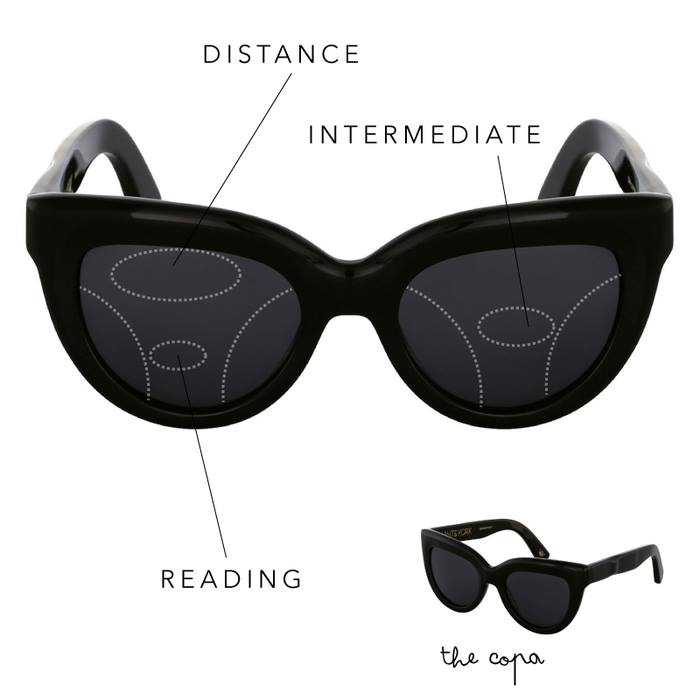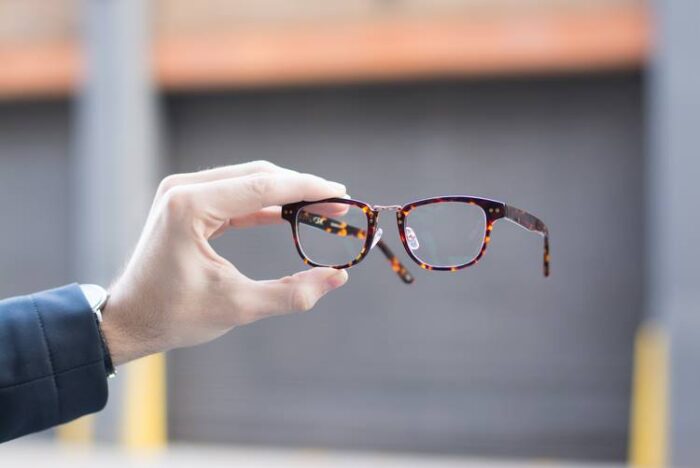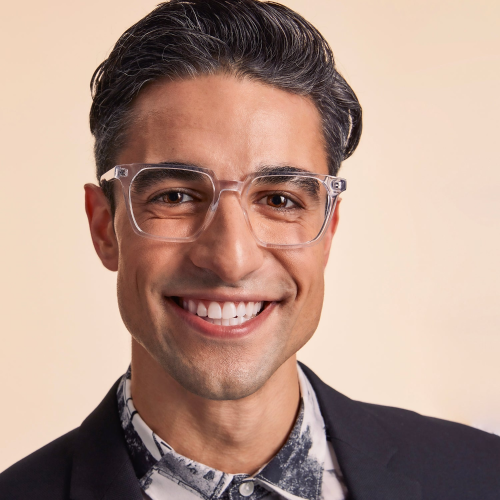
How to use your FSA / HSA towards your eyewear purchase
“Can I use my HSA for glasses?” It’s one of the most common insurance-related questions we get here at Vint & York and we’re happy to report that the answer is YES.
Yep, you can use your Flexible Spending Account (FSA) or Health Savings Account (HSA) dollars to buy prescription eyeglasses, contact lenses, eyeglasses, eye exams, and prescription sunglasses.
Glasses (and prescription eyewear in general) are an eligible and approved expense under both FSA or HSA plans. You can use these funds for prescription eyewear , regardless of whether or not you have vision insurance. And if you use your flex spending or HSA debit card, you can skip the hassle of having to submit a reimbursement form to your insurance provider!
In this guide, we’re covering everything you ever wanted to know about how to leverage your FSA or HSA. Glasses shopping is a breeze when you use these convenient, flexible purchasing options at Vint & York.
Don’t wait until the last moment to take care of your vision! Here’s how to buy the frames you need with HSA or FSA insurance:
What Is an FSA and an HSA?
Both the flexible spending account (FSA, in short) and the health savings account (HSA, in short) are programs designed to help set aside certain amounts of money, before taxes are applied to your paycheck, for healthcare expenses. But be advised that not all healthcare procedures or needs might be covered by these funds.
FSA
The flexible spending account allows you to save money for typical healthcare expenses that will be needed during the year. The big advantage is that the money set aside for FSA is tax-free, so the entire contribution goes into your spending budget.
HSA
The health savings account works a bit differently than the FSA. Mainly, the HSA is for people who have health plans with a high deductible, and it comes as additional help to save funds for medical expenses that are excluded from other health plans. As an extra benefit, there are also tax advantages that are applied to the HSA that benefit both you and your employer: this is also pre-tax money added to your account, and this reduces the employer’s payroll taxes.

How Do HSA and FSA Work?
Both HSA and FSA work in a similar fashion, just like a personal savings account, but with the following differences:
- Taxes do not apply to the money coming in
- You can only spend the money on qualifying medical expenses
- The employer is the one who determines the amount they want to contribute to the account
- The employer chooses to offer either one of the two plans, either both of them, depending on your health insurance plan.
To make sure you get the most of your FSA, read the guidelines carefully to know everything that is covered and always check the balance of your account to know how much you can spend, and keep all of your paperwork (you might need certain receipts).

How Does FSA Work?
If you’re signed up for a flexible spending account, a certain amount of funds is automatically deposited from your paycheck, before taxes apply to your salary . This means that you basically get more funds that can be used towards your medical and eyewear expenses that are not included in your vision insurance plan, for example.
However, despite the fact that you are the one who has to open the account, your employer is the one who actually owns the FSA .
How Does HSA Work?
In short, an HSA is just like a bank account. When it comes to the health savings account, you are only eligible if you have a high deductible plan . Your employer can help with this, and even self-employed individuals can take contribute.
Just like the FSA, the money can be automatically deposited from your paycheck pre-taxes .
Unlike the FSA, however, the HSA account will be owned by you and not your employer and anyone can be a contributor to this account: you, your employer or even a relative .
But there are some limitations to the minimum and maximum amounts that can be deposited , according to HSA Center :
- The annual deductibles must be at least $1,350 (self-only coverage) or $2,700 (family coverage)
- You can save up to $3,450 for an individual and $6,900 for a family
- Annual out-of-pocket expenses (deductibles, copayments, and other amounts, but not premiums) cannot exceed $6,650 for self-only coverage and $13,300 for family coverage.
How Do You Know If You Have FSA/HSA?
To find out if you have a flexible spending account or a health savings account you can talk to the HR expert at your workplace, your employer or even the insurance company.
The main advantage of both accounts is that the money deposited is tax-free, so your savings are more substantial than they’d be if you set up a personal account and add to it from your net salary. Also, you’ll have a smaller taxable sum of money than your regular salary, so you’d be paying fewer taxes overall.
But there are further arguments in favor of each type of account.

Why Should You Get an FSA?
If you have ongoing medical expenses that you’re aware of, which is the case with vision care , setting up an FSA will only save you money on taxes by allowing you to get more healthcare treatments with some of the money that would have otherwise gone towards your taxes.
You also have control of the amount that is deducted from your salary, as you’re the one deciding how much you want to contribute and, depending on your benefit plan, your employer may also contribute to your FSA.
Another big plus is that there is no limit to the number of eye exams and glasses renewal you’re allowed to have. The only limit is the amount of money on your account.
Why Open an HSA?
The HSA comes as a support to your already high deductible insurance plan, in order to cover those expenses that are not eligible on your plan. Just as with your FSA, your health savings account money is tax-free, subtracted from your gross salary, allowing you to get more out of your salary.
Withdrawals from your HSA account are also free of tax, as are the interest earnings that can be accumulated. And since any unused money is not forfeited at the end of the year, your savings will continue to grow tax-deferred, according to HSA Center .
What Can You Buy With Your FSA/HSA Card?
Both FSA and HSA plans will cover, among other healthcare necessities, expenses that are related to your vision health . However, each plan is different, so it’s a good idea to know exactly what type of plan you have and what items and procedures are eligible.
As a general rule, eye exams, prescription eyewear (including contact lenses) and even some eye surgeries are usually covered by both plans.

WHAT GLASSES ARE FSA OR HSA ELIGIBLE EXPENSES?
According to official sources like WageWorks, your flexible spending account or health savings account does cover expenses like RX prescription eyewear and:
- Eyeglasses with or without lenses
- Readers glasses
- Prescription sunglasses
- Sunglasses (only if medically necessary and prescribed by a physician)*
- Eye exams
Note that there are some accounts that allow you to buy sunglasses with FSA or HSA funds. The best way to find out if your account covers a specific purchase it to reference the plan’s list of qualified medical expenses or to call the number on your card.
Shop men’s eyeglasses

Shop women’s eyeglasses

ARE VINT & YORK GLASSES COVERED BY FSA OR HSA?
Yes! Eyeglasses are classified as a medical expense, which means they are tax deductible and HSA eligible.
Vint & York accepts FSA dollars for all prescription eyewear purchases as long as your FSA (flexible spending account) or HSA (health savings account) card is affiliated with a major credit card:
- eyeglasses with or without lenses
- prescription sunglasses and non-prescription sunglasses (only if medically necessary and prescribed by a physician)
Shop men’s sunglasses
Shop women’s sunglasses 
These funds can be used for prescription eyewear, regardless of whether or not you have vision insurance.
If you choose to use your FSA or HSA card to pay for just a part of your whole purchase and apply the remaining balance to a different card, please call us at (800) 846-9915 , Mon-Fri 10AM – 6PM. We’re happy to help you with that!

Are prescription sunglasses covered by FSA or HSA?
Yes. Vint & York accepts FSA dollars for prescription sunglasses (only if medically necessary and prescribed by a physician) as long as your FSA (flexible spending account) or HSA (health savings account) card is affiliated with a major credit card.

Shop our prescription sunglasses collection!
DOES FLEX SPENDING ACCOUNT PAY FOR READERS?
Yes to that, too! You can even have your favorite pair of Vint & York frames fitted with your preferred lenses so you get a stylish look using this excellent benefit.
Yes, Vint&York’s reading glasses are covered and approved under FSA.

Shop our reading glasses collection!


FSA/HSA Sunglasses: are they covered as an eligible expense?
Sunglasses are eligible with a prescription for flexible spending accounts (FSA), health savings accounts (HSA), health reimbursement accounts (HRA), and limited care flexible spending accounts (LCFSA).
Sunglasses are not eligible with dependent care flexible spending accounts.

How Can You Use FSA or HSA Dollars to Buy Glasses?
The whole process of buying glasses with your FSA or HSA might seem overwhelming at first, but it actually implies a few, very simple steps:
- Step 1: Get informed! Study both of your plans and see which one would be a better fit to cover your expenses.
- Step 2: Renew your prescription. You will need to schedule an appointment with your doctor and get an updated prescription for your eyeglasses and sunglasses, which will also be covered by your FSA or HSA.
- Step 3: Choose your glasses. Visit our online eyewear shop and browse through all of our frames options. Make a shortlist of the ones you like. You can also visit the physical store if you need an extra opinion on which frames fit you.
- Step 4: Buy your glasses. Use your prescription and your FSA/HSA card to buy your favorite pair.
- Step 5: Get your glasses. You can enjoy your new eyewear once the prescription glasses or sunglasses are ready.
- Step 6: Keep your receipt. You might need it at some point, so make sure you keep all important paperwork somewhere safe.
How to Order Glasses Online with FSA/HSA
Your prescription from your doctor is the most important part of the entire process, as is the case regardless if you decide to order online or go to the shop. The rest is a piece of cake.
Whether you want to use your FSA/HSA to order prescription glasses or sunglasses on VintandYork.com, you won’t need to do anything special . You just need to place your order and have an up-to-date prescription from your doctor. The beauty is that payment is super-simple with an HSA. Eyeglasses and sunglasses can be purchased with a debit card issued by the bank where the account is held. It’s as easy as swiping your regular card!
- If you have an FSA or HSA debit card, you can enter that card’s information at check-out, just like you would a normal credit card.
- If you do not have an FSA or HSA debit card, you will have to make your purchase using another credit card and seek reimbursement directly from your FSA or HSA provider.
- You can use your Health Spending Card to pay , or simply attach the itemized receipt to your provider’s reimbursement form before submitting your claim .

Vint&York is an out-of-network provider for most vision insurance plans. However, we are happy to issue an itemized receipt upon request for qualified purchases.
You will have to submit your glasses order for reimbursement in three steps:
- Complete the Out-of-Network Reimbursement Form for your provider.
- Attach your Vint&York itemized receipt
- Submit the receipt and form to your vision insurance company.
DO YOU ACCEPT INSURANCE AS PAYMENT FOR EYEGLASSES?
We don’t work with insurance providers directly.
You can request an itemized receipt and submit for reimbursement. We urge you to clarify all the details with your insurance provider.
When Are My HSA and FSA Funds Available?
Usually, your FSA and HSA funds will be available at the beginning of the year, on January 1st, so you can give yourself the perfect New Year’s present as early as the first day of the year.
Rules: When do your FSA or HSA funds expire?
Like in many other cases, if you don’t use it, you’ll lose it. The same principle applies to funds in these types of accounts. So just remember to use your funds before they expire.
When do FSA funds expire?
Typically, FSA dollars must be used in the same “coverage period” that the money was put aside. Usually the coverage period is defined as one calendar year, ending on Dec. 31st .
However, some plans offer a grace period that will allow you to use your remaining FSA dollars until March 15 of the following year. Any unused FSA funds will be lost once your coverage period expires.
According to federal guidelines, employers can give FSA users a two-and-a-half month grace period or allow up to $500 to roll over to the next year. Make sure to check with your team if that’s your case!

When do HSA funds expire?
HSA dollars never expire and will remain in your account until they are used. If you do not use all of your HSA funds in a given year, the unspent money will roll over into your account for next year.
Is there an FSA/HSA Glasses frames coverage limit?
- FSA/HSA funds can be used to purchase prescription eyewear and/or frames, whether you have vision insurance or not. As long as you check how much you have in fund savings, there is no limit on how many pairs of glasses or prescription sunglasses you can buy.
All our frames start from $109 with no unnecessary upsells!

TIP: Here is the IRS Publication 969 – online IRS publications covering the federal rules on your FSA, HSA, and HRA.
We can make your new FSA/HSA glasses in one hour!
Vint & York offers one hour service for the most standard prescriptions in our retail location only. This comes in handy – you can go for a cup of coffee or just stroll the lovely streets of NoLita and pick up the eyeglasses at your convenience!

Do you still have some questions?
Call us at 800-846-9915 or e-mail us at support@vintandyork.com













Leave a comment
This site is protected by hCaptcha and the hCaptcha Privacy Policy and Terms of Service apply.